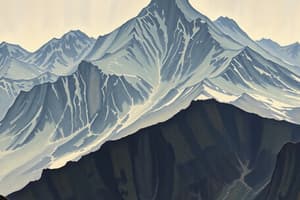Podcast
Questions and Answers
What primarily forms volcanic mountain ranges at the surface during magma rise?
What primarily forms volcanic mountain ranges at the surface during magma rise?
- Continental plates converging (correct)
- Erosion of existing mountains
- Transform fault movements
- Oceanic plates colliding
What is a characteristic of continental-continental convergence?
What is a characteristic of continental-continental convergence?
- Intense deformation and fold-mountain construction (correct)
- Subduction of high-density crust
- Creation of volcanic island arcs
- Formation of ocean basins
Which type of transform boundary is the most abundant?
Which type of transform boundary is the most abundant?
- Ridge-ridge transform fault (correct)
- Trench-trench transform fault
- Ridge-trench transform fault
- Triple junction
What connection do ridge-trench transform faults provide?
What connection do ridge-trench transform faults provide?
Which of the following is true about the densities of continental plates?
Which of the following is true about the densities of continental plates?
Which example illustrates the concept of a triple junction?
Which example illustrates the concept of a triple junction?
What describes trench-trench transform boundaries?
What describes trench-trench transform boundaries?
What notation is used by geologists to classify triple junctions?
What notation is used by geologists to classify triple junctions?
What geological feature is formed as a result of divergent plate boundaries?
What geological feature is formed as a result of divergent plate boundaries?
Which of the following correctly describes oceanic-to-oceanic convergence?
Which of the following correctly describes oceanic-to-oceanic convergence?
What is the process that occurs when oceanic crust is subducted under continental crust?
What is the process that occurs when oceanic crust is subducted under continental crust?
What characterizes transform plate boundaries?
What characterizes transform plate boundaries?
What type of plate boundary is associated with the formation of marine trenches?
What type of plate boundary is associated with the formation of marine trenches?
What happens to the density of plates at divergent boundaries as they move away from the hot spreading center?
What happens to the density of plates at divergent boundaries as they move away from the hot spreading center?
What is a common result of convergence between two continental plates?
What is a common result of convergence between two continental plates?
Which type of plate boundary is also known as 'constructive plate boundaries'?
Which type of plate boundary is also known as 'constructive plate boundaries'?
Flashcards are hidden until you start studying
Study Notes
Plate Boundaries Overview
- Plate boundaries represent the borders between tectonic plates, influencing geological activity.
- The concepts of continental drift and sea floor spreading underpin the understanding of plate tectonics, first attributed to Harry Hess and Robert Dietz.
Types of Plate Boundaries
-
Convergent Plate Boundaries (Destructive)
- Plates move toward each other; can create subduction zones or orogenic belts.
-
Divergent Plate Boundaries (Constructive)
- Plates move apart, forming rifts or gaps, leading to the creation of new crust as magma rises and solidifies.
- Mid-ocean ridges are formed underwater; rift valleys can emerge on land.
- Example: Great East African Rift Valley spans Sudan, Ethiopia, Kenya, and Tanzania.
-
Transform Plate Boundaries (Conservative)
- Plates slide past each other horizontally, causing earthquakes without forming mountains or volcanoes.
Types of Convergent Boundaries
-
Oceanic-to-Oceanic Convergence
- Two oceanic plates collide, leading to one being subducted, forming deep sea trenches and volcanic island arcs.
- Example: Formation of the Hawaiian Islands.
-
Oceanic-to-Continental Convergence
- Oceanic crust is denser and always subducts beneath continental crust, creating oceanic trenches and volcanic mountain ranges like the Andes and Cascades.
-
Continental-to-Continental Convergence
- Both plates are less dense, causing minimal subduction. Intense deformation leads to the formation of fold mountains.
- Example: Himalayan mountain range.
Types of Transform Boundaries
-
Ridge-Ridge Transform Fault
- Connects segments of divergent boundaries; most common type. Shearing movement occurs with displacement along ridges.
- Example: Fault at the Dead Sea.
-
Ridge-Trench Transform Fault
- Connects a ridge to a trench; less common but significant in connecting spreading and converging plates.
- Example: Queen Charlotte Island Fault near Canada.
-
Trench-Trench Transform Boundaries
- Links two trenches at separate convergent plate boundaries; rare occurrence.
- Example: Alpine Fault in New Zealand.
Triple Junctions
- Points where three plate boundaries meet, indicating interactions between ridges, trenches, and transform faults.
- Notational system:
- R (ridge): plates moving apart.
- T (trench): plates moving together.
- F (fault): all plates moving horizontally.
- Example: Afar Depression triple junction in the East African Rift system.
Studying That Suits You
Use AI to generate personalized quizzes and flashcards to suit your learning preferences.




